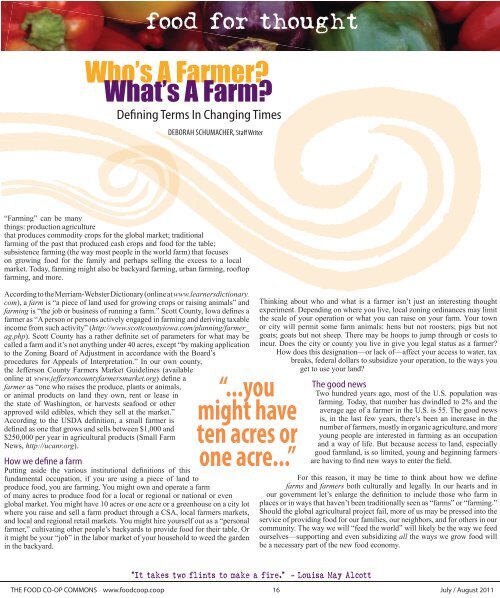THE FOOD CO-OP - Port Townsend Food Co-op
THE FOOD CO-OP - Port Townsend Food Co-op
THE FOOD CO-OP - Port Townsend Food Co-op
Create successful ePaper yourself
Turn your PDF publications into a flip-book with our unique Google optimized e-Paper software.
food for thought<br />
Who’s A Farmer?<br />
What’s A Farm?<br />
“Farming” can be many<br />
things: production agriculture<br />
that produces produces commodity cr<strong>op</strong>s for the global market; market; traditional<br />
farming of the past that produced cash cr<strong>op</strong>s and food for the table;<br />
subsistence farming (the way most pe<strong>op</strong>le in the world farm) that focuses<br />
on growing food for the family and perhaps selling the excess to a local<br />
market. Today, farming might also be backyard farming, urban farming, rooft<strong>op</strong><br />
farming, and more.<br />
According to the Merriam-Webster Dictionary (online at www.learnersdictionary.<br />
com), a farm is “a piece of land used for growing cr<strong>op</strong>s or raising animals” and<br />
farming is “the job or business of running a farm.” Scott <strong>Co</strong>unty, Iowa defi nes a<br />
farmer as “A person or persons actively engaged in farming and deriving taxable<br />
income from such activity” (http://www.scottcountyiowa.com/planning/farmer_<br />
ag.php). Scott <strong>Co</strong>unty has a rather defi nite set of parameters for what may be<br />
called a farm and it’s not anything under 40 acres, except “by making application<br />
to the Zoning Board of Adjustment in accordance with the Board’s<br />
procedures for Appeals of Interpretation.” In our own county,<br />
the Jefferson <strong>Co</strong>unty Farmers Market Guidelines (available<br />
online at www.jeffersoncountyfarmersmarket.org) defi ne a<br />
farmer as “one who raises the produce, plants or animals,<br />
or animal products on land they own, rent or lease in<br />
the state of Washington, or harvests seafood or other<br />
approved wild edibles, which they sell at the market.”<br />
According to the USDA defi nition, a small farmer is<br />
defi ned as one that grows and sells between $1,000 and<br />
$250,000 per year in agricultural products (Small Farm<br />
News, http://ucanr.org).<br />
Defi ning Terms In Changing Times<br />
DEBORAH SCHUMACHER, Sta Writer<br />
“...you<br />
might have<br />
ten acres or<br />
one acre...”<br />
How we defi ne a farm<br />
Putting aside the various institutional defi nitions of this<br />
fundamental occupation, if you are using a piece of land to<br />
produce food, you are farming. You might own and <strong>op</strong>erate a farm<br />
of many acres to produce food for a local or regional or national or even<br />
global market. You might have 10 acres or one acre or a greenhouse on a city lot<br />
where you raise and sell a farm product through a CSA, local farmers markets,<br />
and local and regional retail markets. You might hire yourself out as a “personal<br />
farmer,” cultivating other pe<strong>op</strong>le’s backyards to provide food for their table. Or<br />
it might be your “job” in the labor market of your household to weed the garden<br />
in the backyard.<br />
“It takes two flints to make a fire.” - Louisa May Alcott<br />
Thinking about who and what is a farmer isn’t just an interesting thought<br />
experiment. Depending on where you live, local zoning ordinances may limit<br />
the scale of your <strong>op</strong>eration or what you can raise on your farm. Your town<br />
or city will permit some farm animals: hens but not roosters; pigs but not<br />
goats; goats but not sheep. There may be ho<strong>op</strong>s to jump through or costs to<br />
incur. Does the city or county you live in give you legal status as a farmer?<br />
How does this designation—or lack of—affect your access to water, tax<br />
breaks, federal dollars to subsidize your <strong>op</strong>eration, to the ways you<br />
get to use your land?<br />
The good news<br />
Two hundred years ago, most of the U.S. p<strong>op</strong>ulation was<br />
farming. Today, that number has dwindled to 2% and the<br />
average age of a farmer in the U.S. is 55. The good news<br />
is, in the last few years, there’s been an increase in the<br />
number of farmers, mostly in organic agriculture, and more<br />
young pe<strong>op</strong>le are interested in farming as an occupation<br />
and a way of life. But because access to land, especially<br />
good farmland, is so limited, young and beginning farmers<br />
are having to fi nd new ways to enter the fi eld.<br />
For this reason, it may be time to think about how we defi ne<br />
farms and farmers both culturally and legally. In our hearts and in<br />
our government let’s enlarge the defi nition to include those who farm in<br />
places or in ways that haven’t been traditionally seen as “farms” or “farming.”<br />
Should the global agricultural project fail, more of us may be pressed into the<br />
service of providing food for our families, our neighbors, and for others in our<br />
community. The way we will “feed the world” will likely be the way we feed<br />
ourselves—supporting and even subsidizing all the ways we grow food will<br />
be a necessary part of the new food economy.<br />
<strong>THE</strong> <strong>FOOD</strong> <strong>CO</strong>-<strong>OP</strong> <strong>CO</strong>MMONS www.foodco<strong>op</strong>.co<strong>op</strong> 16 July / August 2011


